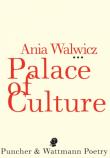AustLit
Latest Issues
AbstractHistoryArchive Description
'Palace of Culture is a dream diary, leading the reader into a personal and surreal engagement with the bewildering complexity of contemporary popular culture. Like her previous work Red Roses, Palace is a freewheeling work drawing the reader in to participate in its very construction. The layering of the oneiric on top of popular culture results in an intriguing interweaving of symbolic meanings (the notation and enactment of inner-states of feeling and being) with the arbitrary marketing decisions of our broader cultural stage. The language of Palace of Culture is not only the subject’s medium, but a source of revelation itself, a phantasm. It is something that is dreamt by its author and its reader, in the palace, at four a.m.' (Publication summary)
Publication Details of Only Known VersionEarliest 2 Known Versions of
Works about this Work
-
‘Words about Words Make Sure Self’ : Ania Walwicz and a Politics of Prose Poetry
2017
single work
criticism
— Appears in: TEXT Special Issue Website Series , October no. 46 2017;'This paper examines how Ania Walwicz uses the protean nature of the prose poem as a medium through which to subvert traditional notions of identity, especially in terms of anxieties about gender and sexuality. According to Dominique Hecq (2009), the prose poem is able to negotiate ‘between notions of a public language of prose and a marginal language of poetry, thereby … enacting particularly complex modes of engagement between subjectivity and the world’. This paper argues that it is the slippery and transformative nature of the prose poem that lends itself so neatly to a politics of subversion. As a ‘borderline genre’ (Hecq 2009), the prose poem occupies an ambiguous space – it is self-conscious and critical yet immersive and seductive; a medium that offers a deceptive simplicity, or a shocking confrontation with otherness. Oftentimes, the prose poem is capable of both in the same instance. By exploring the prose poetry of Walwicz, this paper contends that rather than being understood as a ‘disturbing and elusive’ literary oddity (Delville 1998), the prose poem can be seen to contest formal traditions of both narrative and identity.' (Publication abstract)
-
Ania Walwicz : A Sense of the Prodigious
2015
single work
review
— Appears in: Australian Poetry Journal , vol. 5 no. 1 2015; (p. 149-151)
— Review of Palace of Culture 2014 selected work poetry -
Julie Chevalier, of Ania Walwicz, Palace of Culture, and Lisa Jacobson, South in the World
2015
single work
review
— Appears in: Southerly , vol. 75 no. 1 2015; (p. 242-246)
— Review of Palace of Culture 2014 selected work poetry ; South in the World 2014 selected work poetry -
Review : Palace of Culture
2014
single work
review
— Appears in: Australian Book Review , November no. 366 2014; (p. 71)
— Review of Palace of Culture 2014 selected work poetry
-
Review : Palace of Culture
2014
single work
review
— Appears in: Australian Book Review , November no. 366 2014; (p. 71)
— Review of Palace of Culture 2014 selected work poetry -
Julie Chevalier, of Ania Walwicz, Palace of Culture, and Lisa Jacobson, South in the World
2015
single work
review
— Appears in: Southerly , vol. 75 no. 1 2015; (p. 242-246)
— Review of Palace of Culture 2014 selected work poetry ; South in the World 2014 selected work poetry -
Ania Walwicz : A Sense of the Prodigious
2015
single work
review
— Appears in: Australian Poetry Journal , vol. 5 no. 1 2015; (p. 149-151)
— Review of Palace of Culture 2014 selected work poetry -
‘Words about Words Make Sure Self’ : Ania Walwicz and a Politics of Prose Poetry
2017
single work
criticism
— Appears in: TEXT Special Issue Website Series , October no. 46 2017;'This paper examines how Ania Walwicz uses the protean nature of the prose poem as a medium through which to subvert traditional notions of identity, especially in terms of anxieties about gender and sexuality. According to Dominique Hecq (2009), the prose poem is able to negotiate ‘between notions of a public language of prose and a marginal language of poetry, thereby … enacting particularly complex modes of engagement between subjectivity and the world’. This paper argues that it is the slippery and transformative nature of the prose poem that lends itself so neatly to a politics of subversion. As a ‘borderline genre’ (Hecq 2009), the prose poem occupies an ambiguous space – it is self-conscious and critical yet immersive and seductive; a medium that offers a deceptive simplicity, or a shocking confrontation with otherness. Oftentimes, the prose poem is capable of both in the same instance. By exploring the prose poetry of Walwicz, this paper contends that rather than being understood as a ‘disturbing and elusive’ literary oddity (Delville 1998), the prose poem can be seen to contest formal traditions of both narrative and identity.' (Publication abstract)




